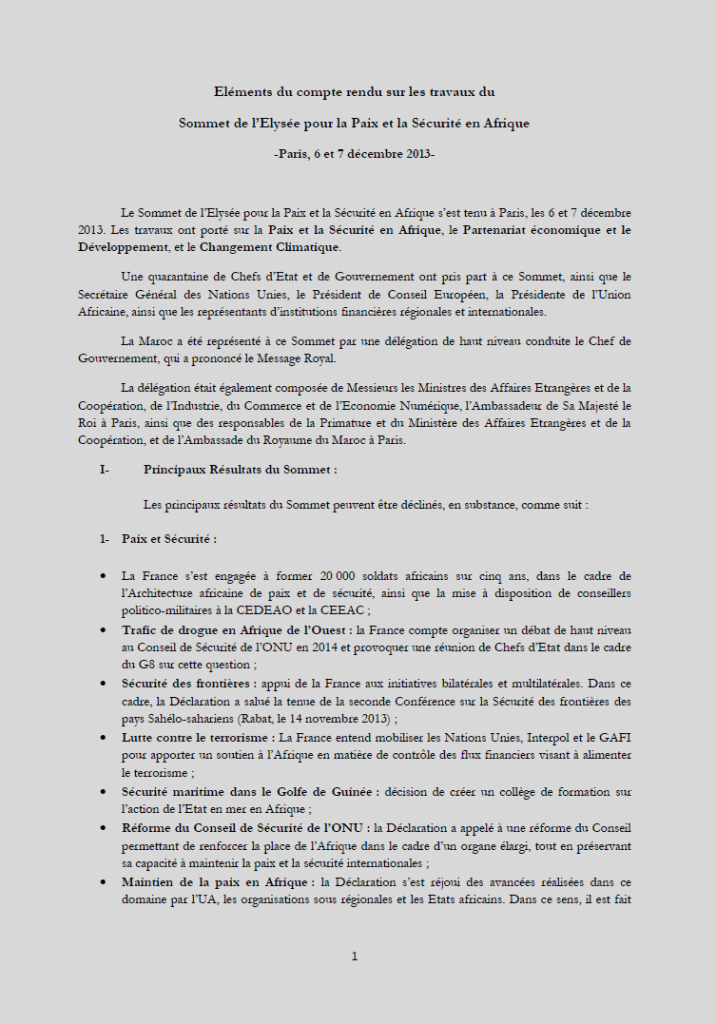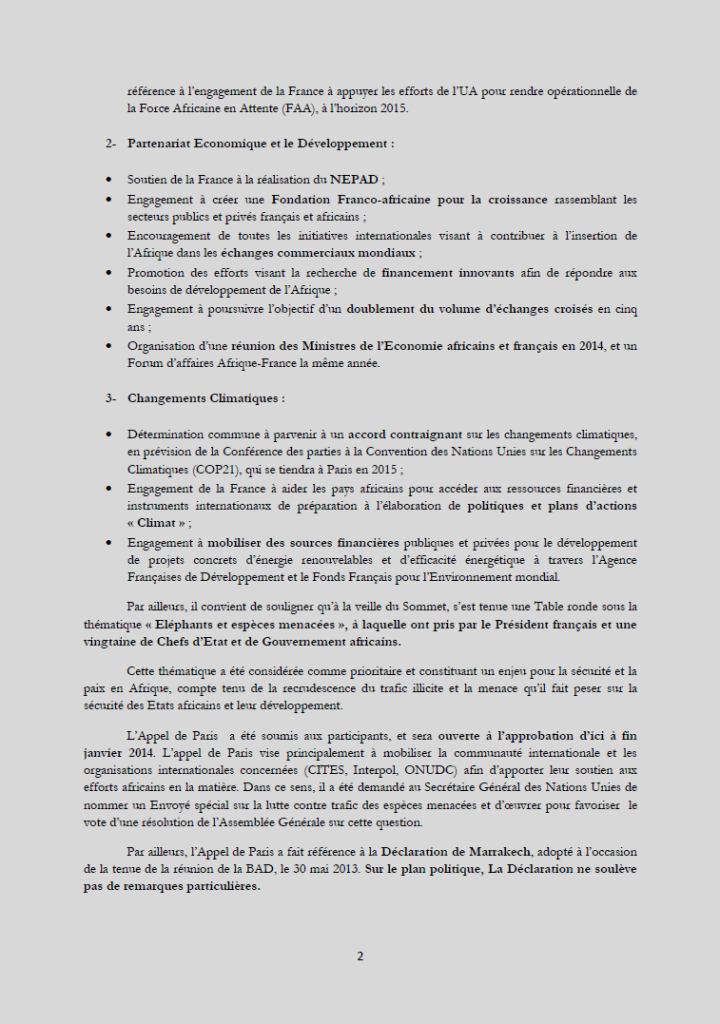Tags: Morocco, France, Africa, Western Sahara, African Union, Élysée Summit for Peace and Security in Africa,
Elements of the Report on the Proceedings of the Élysée Summit for Peace and Security in Africa – Paris, December 6–7, 2013
The Élysée Summit for Peace and Security in Africa was held in Paris on December 6–7, 2013. The discussions focused on Peace and Security in Africa, Economic Partnership and Development, and Climate Change.
Around forty Heads of State and Government participated in the Summit, along with the United Nations Secretary-General, the President of the European Council, the Chairperson of the African Union, and representatives of regional and international financial institutions.
Morocco was represented at this Summit by a high-level delegation led by the Head of Government, who delivered the Royal Message. The delegation also included the Ministers of Foreign Affairs and Cooperation, Industry, Trade, and the Digital Economy; His Majesty the King’s Ambassador to Paris; as well as officials from the Prime Minister’s Office, the Ministry of Foreign Affairs and Cooperation, and the Embassy of the Kingdom of Morocco in Paris.
I. Key Outcomes of the Summit
1. Peace and Security:
France committed to training 20,000 African soldiers over five years under the African Peace and Security Architecture, as well as providing political-military advisors to ECOWAS and ECCAS.
Drug trafficking in West Africa: France plans to organize a high-level debate at the UN Security Council in 2014 and convene a meeting of Heads of State within the G8 framework on this issue.
Border security: France supports bilateral and multilateral initiatives. In this context, the Declaration welcomed the holding of the Second Conference on Border Security of Sahel-Saharan Countries (Rabat, November 14, 2013).
Counterterrorism: France intends to mobilize the UN, Interpol, and FATF to support Africa in monitoring financial flows that fund terrorism.
Maritime security in the Gulf of Guinea: Decision to establish a training college on state action at sea in Africa.
UN Security Council reform: The Declaration called for a reform that strengthens Africa’s position within an expanded body while preserving its ability to maintain international peace and security.
Peacekeeping in Africa: The Declaration welcomed the progress made by the AU, sub-regional organizations, and African states in this area. In this regard, it referenced France’s commitment to supporting AU efforts to operationalize the African Standby Force (ASF) by 2015.
2. Economic Partnership and Development:
France’s support for the implementation of NEPAD.
Commitment to establishing a Franco-African Foundation for Growth, bringing together French and African public and private sectors.
Encouragement of all international initiatives aimed at integrating Africa into global trade.
Promotion of efforts to seek innovative financing to meet Africa’s development needs.
Commitment to doubling the volume of bilateral trade within five years.
Organization of a meeting of African and French Economy Ministers in 2014, along with a France-Africa Business Forum the same year.
3. Climate Change:
Shared determination to reach a binding agreement on climate change ahead of the UN Climate Change Conference (COP21) in Paris in 2015.
France’s commitment to helping African countries access financial resources and international instruments for preparing climate policies and action plans.
Commitment to mobilizing public and private funding for developing concrete renewable energy and energy efficiency projects through the French Development Agency (AFD) and the French Global Environment Facility (FFEM).
Furthermore, it is important to highlight that on the eve of the Summit, a roundtable discussion was held under the theme « Elephants and Endangered Species, » which was attended by the French President and around twenty African Heads of State and Government. This theme was considered a priority and a challenge for security and peace in Africa, given the surge in illegal trafficking and the threat it poses to the security and development of African states.
The Paris Call was presented to the participants and will remain open for endorsement until the end of January 2014. The Paris Call primarily aims to mobilize the international community and relevant international organizations (CITES, Interpol, UNODC) to support African efforts in this regard. In this context, the UN Secretary-General was requested to appoint a Special Envoy on combating the trafficking of endangered species and to work toward the adoption of a UN General Assembly resolution on this issue.
Additionally, the Paris Call referenced the Marrakech Declaration, adopted during the African Development Bank (AfDB) meeting on May 30, 2013. Politically, the Declaration does not raise any particular concerns. Morocco, after consulting the Directorate of Legal and Treaty Affairs, may express support for the adoption of this Declaration and notify its acceptance to the relevant French authorities.
II. Observations and Comments:
Despite the challenges encountered during the negotiation of the final Declaration, France was able to achieve its objectives. Apart from a few amendments, the original draft did not undergo major changes. France’s firm opposition to any « re-drafting » of the text, along with the restricted format of the Foreign Ministers’ meeting, helped « lock in » the negotiation process. In this effort, France could rely on its traditional allies (West and Central Africa).
The Summit is seen as a significant step ahead of upcoming international events, particularly the EU-Africa Summit in April 2014, which may explain France’s desire to play a mobilizing role for Africa within the EU.
The importance France places on the African Union (AU) in maintaining peace and security could be explained by its concern to reassert its legitimacy and presence in Africa (the reference to the African Peace and Security Architecture is a clear illustration of this) and to seek consensus among emerging African countries that do not necessarily share France’s vision and objectives on peace and security in Africa.
The economic aspect of the Declaration did not represent a « breakthrough » in France’s African policy. Aside from the planned meeting of French and African economy ministers and the holding of a business forum between the two partners, this aspect remained modest compared to African expectations, particularly given the global economic and financial crisis context.
Within this process, Morocco should continue to consolidate and strengthen its support for the sub-regional approach by embracing the themes discussed at the Summit within groups such as CEN-SAD, ECOWAS, ECCAS, and the Atlantic Coast States Initiative, with the aim of limiting any predominant role of the AU. France, for its part, should be made aware of the implications of the AU’s growing role, particularly regarding the operationalization of the African Standby Force.
Thanks to the mobilization of the Moroccan delegation and France’s support, no controversial language was introduced regarding the issue of the Moroccan Sahara.
Algeria, deprived of its traditional allies and faced with the host country’s firm stance, did not attempt to pursue its usual maneuvers during such exercises involving the AU.*



#Africa #France #Morocco #FranceAfricaSummit #CENSAD #ECOWAS #ECCAS #AfricanUnion #WesternSahara
Be the first to comment on "Morocco Leaks : How France imposed its agenda in Élysée Summit for Peace and Security in Africa was held in Paris on December 6–7, 2013"